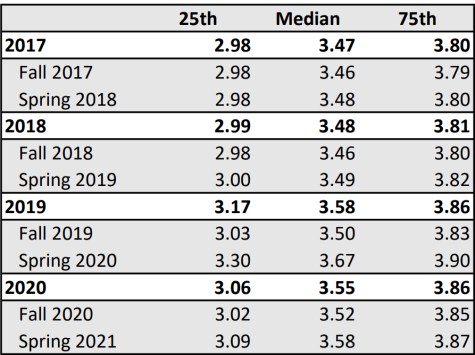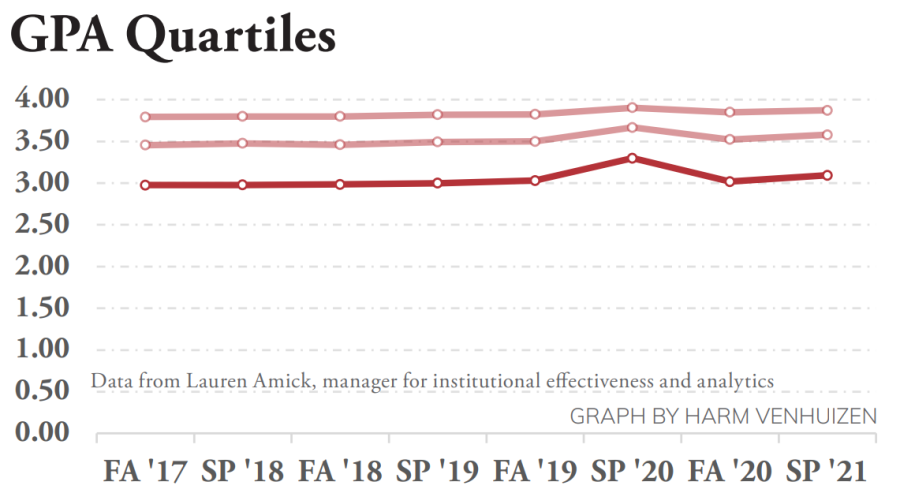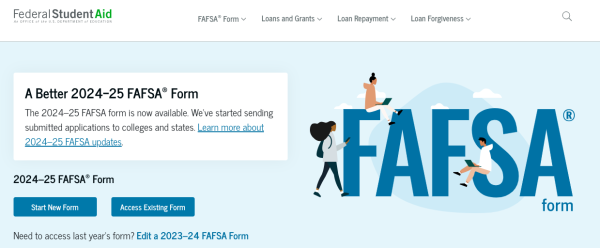GPAs increased during COVID lockdown. Did learning?
Few people would call the pandemic a good thing.
“It was a recipe for disaster,” said junior Timothy Stephens, describing a brutal combination of isolation, declining mental health and professors who assigned too much work. Accordingly, they reported a “dramatic” drop in their GPA during the pandemic.
But Stephens’ experience was the exception, not the rule. On the whole, Calvin students’ GPAs actually increased when the pandemic began.
The Calvin student population — as a group — performs about the same from semester to semester. In the five semesters preceding COVID, median term GPAs ranged from 3.46 to 3.50, based on data provided by Lauren Amick, manager of Calvin’s institutional effectiveness and analytics.
But in spring 2020, when COVID struck, Calvin students’ median GPA shot to 3.67. This represents an increase of almost 5 percent from the previous semester — unprecedented in recent years. The 75th percentile improved slightly from the semester before, too, but the most significant increase was found in the lowest-performing group: the 25th percentile term GPA increased by 9 percent, from 3.03 in fall 2019 to 3.30 in spring 2020.
The proportion of students on the deans’ list also increased from 42 percent in fall 2019 to nearly 47 percent in spring 2020 — the highest percentage in recent years, according to information from the registrar’s office.

These findings are anything but intuitive. After all, the pandemic was a source of stress and extraordinary challenges for many. So what accounts for these changes?
Calvin students’ saving grace may have been the pass-fail option, said Amick. In spring 2020, students were given the option to change two course grades to “satisfactory,” for grades of D- or better, or “unsatisfactory,” for grades of F. These markings were not factored into GPAs. Over 800 students took advantage of this opportunity, according to Amick.
This was not a perfect solution for everyone. For Stephens, the pass-fail option partially cushioned the GPA blow, but it did not do enough. “If they would’ve done pass-fail options for every class, it would’ve saved my GPA,” they said.
In fall 2020, students could no longer replace their grades with “satisfactory” or “unsatisfactory.” In turn, semester GPAs returned to their typical levels.
But there may be additional explanations for spring 2020’s brief GPA spike. David Urban, professor of English, suggested that the forced isolation of the pandemic, while not ideal for mental health, was academically beneficial. “COVID might have actually helped their GPAs, because there were so few activities for them to do,” said Urban, describing the grades in his interim 2021 class as the highest he had ever seen. Suddenly, students had much more time to devote to schoolwork, and their GPAs jumped accordingly.
Such was the case for senior Duy Nguyen. “COVID gave me more time to focus on my own studies and less time for distraction,” he said.
But many experienced difficulties with this isolation. “I think collaboration on schoolwork is one of the ways I learn the most,” junior Jeffrey Amidon said. At the height of COVID, these opportunities were virtually nonexistent.
When COVID struck, Amidon, a first-year student at the time, was enrolled in foundational chemistry courses. But the transition to virtual learning was a difficult one. “Online chemistry lab? You just don’t learn it quite the same,” he said. Amidon’s GPA decreased accordingly, but the detrimental impacts of this phenomenon extended well beyond the spring of 2020.
“The foundation for all of chem that is set in gen chem was not set quite as well,” he explained. “So the subsequent classes were much more difficult.”
Amidon, who planned to become a high school chemistry teacher, was worried that these ripple effects may extend to his career, too. “My experience with that material was warped,” he said, “which, in some way or another, will affect my ability to teach it.”
For many, like Amidon, the full ramifications of COVID semesters may extend far beyond the impact on GPA.
Although senior Christina Romano’s GPA improved during the lockdown, she attributed this bump to easier assignments and professorial leniency. “I think professors had to sacrifice giving rigorous, typical assignments in order to account for technological issues and the inconveniences of COVID,” she explained. “It was completely understandable, but at the same time, I couldn’t help but feel like I wasn’t getting the same challenges — to my learning or my GPA.” This was not the case for every class, Romano noted, but certainly for many.
As Romano’s experience illustrates, regardless of GPA, the pandemic may have harmed student learning in ways that are much more difficult to quantify.









Michael Maxin • Jun 22, 2023 at 8:41 pm
BULLSHIT. the average GPA of students in our country, went down during covid.